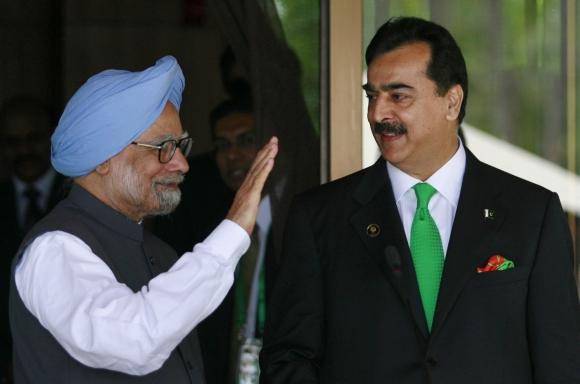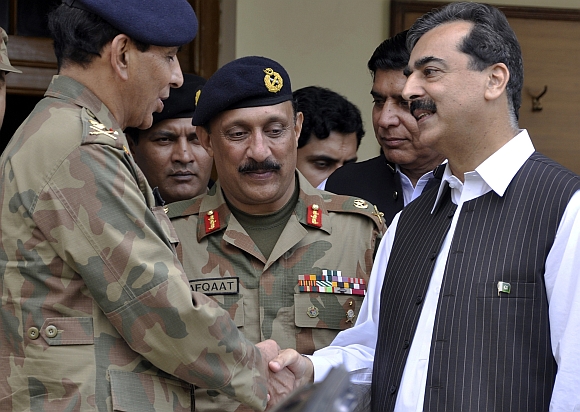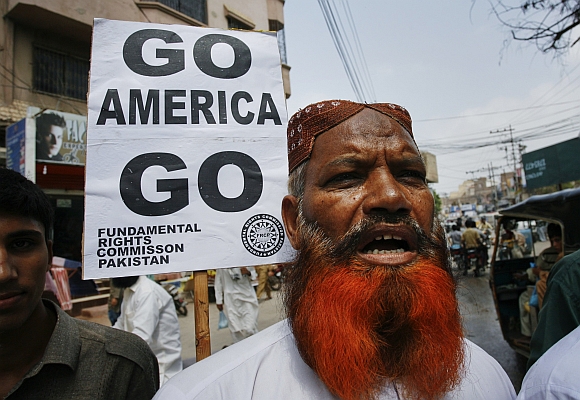 | « Back to article | Print this article |
'Pak's relationship with India, better than its ties with US'
With the most recent nosedive in United States-Pakistan relations in the aftermath of the North Atlantic Treaty Organisation strike that killed 24 Pakistani soldiers, ironically, India-Pakistan relations seem to be on a more solid footing than the so-called US-Pakistan strategic partnership, said Thomas Donnelly, resident scholar at the American Enterprise Institute, who specialises in defence and security policy.
Donnelly, who was a panelist on the AEI's seminar on 'Military reform in Pakistan: Will the army allow politicians to rule?' said, "Now it seems as if the India-Pakistan relationship is currently probably on better footing than US-Pakistan relationship."
"Whether that is something that we can build upon over the long-term is a questionable thing," he said, but predicted, "trying to foster some sort of rapprochement, and clearly, the Indians aren't nearly as interested in keeping up the hostility of the past all that much."
Click NEXT to read further...
'Need to reform Pak military's role in Pakistani society'
Donnelly, who heads the neo-conservative think-tank's Center for Defence Studies, said, "But again, particularly helping Pakistan to accommodate to new strategic facts -- India's rise, a persistent American presence in the region and likewise, trying to dissuade and discourage Pakistan from looking to outsiders, particularly the Chinese as the safety valve when things are going bad with us."
He recalled, referring to Pakistan always describing China as its all-weather friend and implying the US is a fair-weather friend, "There was yet another attempted Pakistan-China love fest that included the singing of some romantic ballads, but mostly on the Pakistani side."
Donnelly, a former policy group director and professional staffer on the House Armed Services Committee and erstwhile editor of the Armed Forces Journal, Army Times, and Defense News, argued that "a key to all of this is fundamentally finding a way to reform and to change the role of the Pakistani military plays in Pakistani society."
'US either lives with Pak as they are or without them'
But he acknowledged, "That's not something that we can do easily or from the outside," and noted that "it's often said, and not without some good reason that Pakistan is an army with a state rather than a state with an army."
"That oversimplifies things but it elucidates a truth -- some of those cliches have a ring of truth to it," he said.
Donnelly said, however, "Whether Pakistan is an enemy or friend is almost immaterial. The fact is we can either live with them as they are or live without them."
US-Pak ties in 2011: 'Year of many valleys and no peaks'
Sadanand Dhume, resident fellow at AEI, and the South Asia policy analyst at the think-tank, who moderated the panel discussion, said 2011 has been "a particularly interesting year in terms of US-Pakistan relations and it seems to have been a year of many valleys and no peaks."
Dhume, who is also a South Asia columnist for The Wall Street Journal, recalled that "the relationship began going downhill," first with the arrest of Central Investigation Agency operative Raymond Davis over the killing of two Pakistanis in Lahore, which created a major diplomatic incident, followed by of course, the Navy SEALS operation in the killing of Osama bin Laden in Abbottabad near Islamabad unbeknownst to the Pakistani military and most recently the NATO attack which killed 24 Pakistani soldiers.
"This was preceded by the resignation of Pakistan's ambassador to the US Husain Haqqani under somewhat murky circumstances," he reminded the audience.


